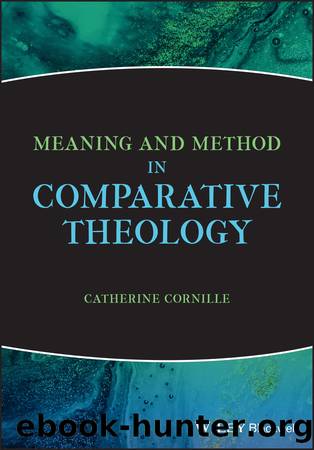Meaning and Method in Comparative Theology by Cornille Catherine;

Author:Cornille, Catherine; [Cornille, Catherine]
Language: eng
Format: epub
Publisher: John Wiley & Sons, Incorporated
Published: 2019-04-02T00:00:00+00:00
It is true that the discipline of comparative theology has developed mainly within Christian theological circles. This may be partly an attempt to reverse (and repent for) older colonialist and imperialist attitudes toward other religions and cultures. But it is also due to the place of theology and religious studies in the Western academy, and to the opportunities to study other religions in a systematic way while reflecting critically and constructively on one's own theological presuppositions. Though there are different ways of approaching comparative theology (as pointed out in Chapter 2), it is generally based in theological presuppositions that preclude the hegemonic appropriation of the other.
As increasing numbers of comparative theologians from other religious traditions or with no single religious background become part of the academy and engage other religions from within their own normative frameworks, they also may come to profit from the insights and practices of other religious traditions. It is indeed through mutual borrowing and lending, and through reciprocal hospitality, that each religion may develop and grow. Reinhold Bernhardt speaks in this regard of âmutual hermeneutical inclusivismâ which is an expression of epistemological realism, rather than theological superiority.114 Even though the use of one's own cherished texts, teachings, and practices by another religious tradition may be regarded as unsettling, it may also be seen as an honor to have served as inspiration for another religious tradition.
If all forms of understanding or interpretation of another from within one's own normative perspective are deemed hegemonic, then comparative theology is certainly guilty as charged. But this view would stifle all possibility for an open and mutually constructive engagement between religions and ignore the ways in which religions have absorbed and continue to consciously and unconsciously absorb elements from one another for their mutual edification. As religious texts, teachings, and practices have become part of the heritage of humanity, it would seem futile to prohibit the circulation and mutual fecundation of religious ideas out of an exaggerated sense of protectiveness, however noble its intentions. Rather than diminishing or domesticating the other religion, comparative theology may in fact contribute to the affirmation and valuation of the other tradition.
Download
This site does not store any files on its server. We only index and link to content provided by other sites. Please contact the content providers to delete copyright contents if any and email us, we'll remove relevant links or contents immediately.
The Lost Art of Listening by Michael P. Nichols(7169)
Why I Am Not A Calvinist by Dr. Peter S. Ruckman(4048)
The Rosicrucians by Christopher McIntosh(3373)
Wicca: a guide for the solitary practitioner by Scott Cunningham(3045)
Signature in the Cell: DNA and the Evidence for Intelligent Design by Stephen C. Meyer(2879)
Real Sex by Lauren F. Winner(2869)
The Holy Spirit by Billy Graham(2779)
To Light a Sacred Flame by Silver RavenWolf(2680)
The End of Faith by Sam Harris(2637)
The Gnostic Gospels by Pagels Elaine(2400)
Waking Up by Sam Harris(2332)
Nine Parts of Desire by Geraldine Brooks(2283)
Jesus by Paul Johnson(2230)
Devil, The by Almond Philip C(2207)
The God delusion by Richard Dawkins(2192)
Heavens on Earth by Michael Shermer(2190)
Kundalini by Gopi Krishna(2094)
Chosen by God by R. C. Sproul(2057)
The Nature of Consciousness by Rupert Spira(1983)
